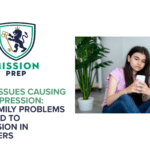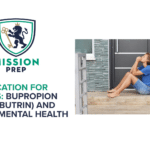What Is Depression? Signs, Symptoms & Causes

We all have days when we don’t feel at our best – it’s normal to feel “blue” or sad from time to time. Yet, if our “off” days start to outweigh the good, it may be a sign of a deeper issue.
The teenage years are a period that people often associate with hormonal changes and mood shifts, but teenage depression goes beyond general “moodiness.” Depression in teens can affect every aspect of a teenager’s life, including their well-being, relationships, behaviors, and ability to learn. Plus, teenage depression is, unfortunately, a widespread problem. According to the World Health Organization, depression occurs in around 1.5% of teenagers aged between 10-14 years old and 3.5% of teens aged between 15-19 years of age.1
Fortunately, if you or someone you care about is showing signs of depression, it is a treatable condition. Understanding depression and why it happens, as well as seeking support, can help a teenager build the foundations for a brighter present and future.
This page can help by discussing:
- What depression in teenagers is
- The signs of depression in teens
- Causes of teenage depression
- Understanding teen depression and how to manage it
- Therapy options for teens with depression
- When to seek help for depression symptoms in teens

Key Takeaways
- Teen depression can lead to persistent sadness, withdrawal from activities, and changes in sleep, appetite, and concentration.
- Common causes of teen depression include trauma, bullying, academic pressure, social media influence, and family issues.
- Treatment options for teen depression include individual therapy, family counseling, and, in some cases, medication.
- Teens are encouraged to talk to trusted adults or mental health professionals when symptoms interfere with daily life.
- Early intervention and a supportive environment can greatly improve outcomes for teens struggling with depression.
Table of Contents
What Is Depression in Teens?
The teen depression definition, according to the American Psychological Association (APA), is “Extreme sadness or despair which lasts more than days.” In other words, while moods can shift relatively quickly, depression can persist for longer than just having a couple of “bad days.”
Depression can affect all aspects of a teenager’s life, including their ability to think, sleep, eat, and learn. It also impacts their beliefs about themselves, often causing them to see themselves as “worthless” or “unloveable.”2
Additionally, depression is one of the most widespread mental health conditions in the United States – and it commonly starts in the teenage years.3 Therefore, targeting the early signs and symptoms of depression can help offset long-term effects on a teen’s emotional and physical health.
Signs of Depression in Teens
The longer depression goes on, the more it can affect a teen’s life and well-being. If you’re concerned that you or someone you care about may have depression, the following signs can help you determine whether support and advice are needed. These signs can range from mild to severe depending on factors such as a teen’s age, personality traits, and the type of depression they have.
Emotional Depression Symptoms in Teens4
Teens who are feeling depressed may show the following changes in their emotions:
- Seeming hopeless or “empty”
- Feeling sad or suddenly getting overwhelmed by tears for no clear reason
- No longer being interested in activities or hobbies they once enjoyed
- Irritation, frustration, or anger towards even mild triggers
- Low self-esteem and feelings of worthlessness
- Emotional “numbness” or not being able to experience their emotions
- Indecisiveness
- Self-blame and self-criticism, often towards what they see as “failures” in the past
- Beliefs that the present and future are “bleak”
- Loss of interest in spending time with family and friends
- Difficulties concentrating or problem-solving
- Thoughts about death
Behavioral Depression Symptoms in Teens4
- Frequent tiredness or exhaustion (due to trouble sleeping)
- Increased time spent sleeping
- Talking about being “worthless”
- Outbursts of emotions, such as anger and aggression
- Loss of interest in appearance or hygiene
- Withdrawal from family or friend groups
- Seeming frequently agitated without a clear reason
- Increased conflict with family and friends
- Dulled responses, such as seeming slow to think or physically react
- Difficulties in school, such as poor academic performance or regular absences
- Regularly experiencing physical ailments such as stomach aches or headaches with no apparent medical cause
- Changes in weight due to increased or decreased appetite
- Engaging in risky behaviors, such as self-harm
Causes of Teenage Depression
Depression can happen to anyone, of any age, and from anywhere. Many factors can play a role in whether a teen develops depression, such as their genetics, biology, hormones, and past experiences. However, certain risk factors can increase the chances that a teen will develop depression. These include:
Mental Health Conditions
Having other mental health conditions, such as anxiety and eating disorders, may make a teen more likely to experience symptoms of depression. In fact, research shows that up to 63% of people with an anxiety disorder also meet the criteria for depression. Factors such as low self-esteem and a pessimistic outlook can also contribute to symptoms of depression.5
Having a Family Member With Depression
Studies have shown that depression may have as much as 50% heritability, meaning that if a family member, such as a parent, has depression, then a teen may be more likely to experience it. However, this may not be purely to do with genetics, but perhaps an interaction between genes and stress, such as conflict with family, mistreatment, and being bullied.6
Previous Experiences
Teens who have experienced childhood trauma may be more likely to experience depression than those who have not. Childhood trauma is any distressing event that causes a long-term emotional impact and can be caused by a wide range of events, including abuse, accidents, loss of a loved one, violence, or natural disasters.7
Developmental Conditions
Growing up with issues that can affect the ability to learn and socialize, such as attention deficit hyperactivity disorder (ADHD) and autism spectrum disorder (ASD), could also contribute to signs of depression. Additionally, the more aware a teen is of their differences, the more likely they may be to experience depression.8
Being a Member of the LGBTQIA+ Community
Teens who are members of the LGBTQIA+ community may be more likely to experience depression. This finding has nothing to do with being a part of the community, but instead with how they are treated by the people around them. For instance, being a part of a supportive family environment might protect teens from such mental health issues. Plus, being a member of the LGBTQIA+ community itself may be protective against depression, as teens can feel included and supported by others in it.9
If you or someone you care about is experiencing symptoms of depression, you are not alone. Professional support and advice are available. There are also steps you can take to look after your mental health in the here and now – which we’ll discuss next.

Understanding Teen Depression
Depression can be difficult to cope with by yourself, but there are things you can do to help yourself or a loved one. The following are actions you can take when you feel like things are getting on top of you.
Everyone is different, so what works for some people may not work for you – but trying various activities may help you pinpoint what can be of assistance during times of need.
1. Talk to Someone You Trust
Depression can make you feel isolated and alone – like no one else could understand what you’re going through. But a lot of people experience depression, so talking to someone can help you see that what you’re going through can be understood. You could choose to talk to a parent, caregiver, teacher, mentor, or school nurse; as long as you feel safe in their company, that’s all that matters. If you don’t feel ready to talk to an adult just yet, perhaps consider speaking to a close friend. They may offer to support you when you feel ready to discuss what you’re going through with an adult.
2. Take Every Day Step By Step
Sometimes, depression can make thinking about the day ahead unbearable – like you have an overwhelming amount of tasks to face. If you focus on small steps, such as getting out of bed, taking a shower, and eating breakfast, you can stop yourself from feeling swamped by trying to mentally tackle everything at once. Plus, it’s important to celebrate small wins – no matter how small an action is, if it feels difficult and you still do it, you should be proud of yourself.
3. Find gentle ways to socialize
Socializing can feel exhausting if you have depression. However, withdrawing from friends and family can cause feelings of isolation and loneliness – potentially worsening symptoms of depression. You don’t always have to be “on” when spending time with loved ones; simply watching a movie or playing a video game together still counts as quality time.
4. Stay Active
You don’t have to go to the gym or do an intense workout – even gently moving your body can help manage the symptoms of depression. Perhaps go for a walk, do some stretches, or practice a five-minute Youtube pilates exercise. Exercise in any form can naturally help boost your mood and shift your attention from your thoughts and feelings to the sensations in your body.
5. Find Ways to Relax
It can be hard to relax if you’re experiencing depression – but relaxation techniques can help shift feelings of self-blame and guilt, allowing you to feel more present in the moment. Simply taking a bath or going on a nature walk can be relaxing, but if you struggle to turn off your thoughts during activities such as these, mindfulness and meditation could help. Both of these techniques focus on non-judgmentally experiencing the moment and can help reduce depressive thoughts.
There are many mindfulness techniques. Mindful breathing, for example, can be as simple as just noticing the sound of your breath and how your body feels as you inhale and exhale.
If you or someone you know is showing signs of depression, the techniques mentioned may help. However, it can be difficult to cope with depression by yourself. Therapy for depression can create a strong foundation for coping with the symptoms of depression and creating a bright, positive future.
Mental Health Resources for Teens With Depression
If you think that you or someone you know is depressed, it can help to talk to a medical professional about getting a diagnosis. A diagnosis of depression typically includes a physical exam to rule out any potential physical illnesses that could be contributing to your feelings.
After this, you’ll be asked a series of questions by a mental health professional around things like:
- Your thoughts and feelings
- Your actions at home and school
- Your sleeping and eating patterns
- Whether you have thoughts about hurting yourself
If you get a diagnosis of depression, you will likely be given the option of different talk therapies. The most effective talk therapies for teens with depression include:
CBT can help teens with depression to identify and understand their negative thoughts. It can also target how to challenge these thoughts, build healthy ways of coping with them, and transition these skills into the world outside of therapy.
Interpersonal Therapy
This form of therapy helps teens understand how problems in relationships can contribute to their feelings – and how to work through these issues. Interpersonal therapy can also help a teen figure out the issues behind behaviors and how to manage these for better mental health.
If previous experiences, such as trauma, are contributing to a teen’s symptoms of depression, EMDR can help them process these in a safe, supportive environment. EMDR changes the way trauma is stored in the brain and helps a teen build more positive self-beliefs and ways of coping with life’s challenges.
TMS can be effective in treating treatment-resistant depression. It’s a non-invasive treatment that uses magnetic fields to activate nerve cells in targeted areas of the brain – improving outlook and mood.
Dialectical Behavior Therapy (DBT)
DBT was adapted from CBT for people who struggle with strong or difficult emotions. It can help a teen with depression to develop skills such as distress tolerance, mindfulness, and coping strategies for managing their depression.
These therapies can be offered as a part of a residential mental health treatment program or outpatient program, depending on a teen’s needs.
Aside from talk therapy, a medical professional may also discuss options for medication for depression, as a combination approach is often recommended. However, it’s important to carefully monitor how medications such as antidepressants are used and to check in with your doctor regularly.

When to Seek Help for Depression Symptoms in Teens
Depression can cause a range of emotional, behavioral, and physical health problems that can affect a teenager’s life in a variety of ways. For instance, depression can lead to problems in school, conflict with family, and even thoughts of death. For these reasons, it’s important to seek help for teen depression as soon as possible to help manage its effects.
A teen with depression doesn’t have to deal with what they’re going through alone. Reaching out to a mental health professional can help ensure a bright present and future – where depression doesn’t rule over emotions, thoughts, and actions.
Mission Prep can help. Our team of trained mental health professionals offers comprehensive and individual depression treatment for teens in various locations. We consider depression’s impact on teenagers’ lives, including on sleep, eating habits, energy levels, and ability to think, before creating a treatment package that caters to each teen’s specific needs. Contact us today for support and advice.
References
- World Health Organization. (n.d.). Adolescent mental health. World Health Organization. Retrieved February 17, 2025, from https://www.who.int/news-room/fact-sheets/detail/adolescent-mental-health
- American Psychological Association. (n.d.). Depression. APA. Retrieved February 11, 2025, from https://www.apa.org/topics/depression
- American Psychiatric Association. (n.d.). What is depression? Retrieved February 11, 2025, from https://www.psychiatry.org/patients-families/depression/what-is-depression
- Mayo Clinic Staff. (n.d.). Teen depression: Symptoms and causes. Mayo Clinic. Retrieved from https://www.mayoclinic.org/diseases-conditions/teen-depression/symptoms-causes/syc-20350985
- Beesdo, K., Hofler, M., Leibenluft, E., Lieb, R., & Pine, D. S. (2009). Anxiety and depression in children and adolescents: Developmental trajectories, transmission, and treatment. Biological Psychiatry, 65(8), 603–614. https://doi.org/10.1016/j.biopsych.2008.08.032
- Brent, D., & Maalouf, F. Depressive disorders in childhood and adolescence. 874-892. https://doi.org/10.1002/9781118381953.ch63
- Yin, W., Pan, Y., Zhou, L., Wei, Q., Zhang, S., Hu, H., Lin, Q., Pan, S., Dai, C., & Wu, J. (2022). The relationship between childhood trauma and depressive symptom among Zhuang adolescents: Mediating and moderating effects of cognitive emotion regulation strategies. Frontiers in Psychiatry, 13, 994065. https://doi.org/10.3389/fpsyt.2022.994065
- Hardan, A., & Sahl, R. (1997). Psychopathology in children and adolescents with developmental disorders. Research in Developmental Disabilities, 18(5), 369-382. https://doi.org/10.1016/S0891-4222(97)00016-4
- Wright, M. F., Wachs, S., & Gámez-Guadix, M. (2022). The role of perceived Gay-Straight Alliance social support in the longitudinal association between homophobic cyberbullying and LGBTQIA adolescents’ depressive and anxiety symptoms. Journal of Youth and Adolescence, 51, 1388–1396. https://doi.org/10.1007/s10964-022-01585-6
Teen Depression FAQs
Teen depression may show up as persistent sadness, low energy, irritability, withdrawal from friends and activities, changes in sleep or appetite, and difficulty concentrating. These symptoms often interfere with daily functioning at school or home.
Adolescent depression can stem from a combination of genetic, biological, environmental, and psychological factors. Common contributors include trauma, bullying, academic stress, family conflict, and social media pressure.
Help begins by speaking with a trusted adult, such as a parent, teacher, or school counselor. Professional treatment options include therapy, counseling, and, when needed, medication — all of which can provide tools for coping and recovery.
Mission Prep offers specialized mental health services for teens, including individual therapy, family therapy, and structured treatment programs designed to address the unique emotional needs of adolescents in a safe, supportive environment.
If a teen is experiencing emotional distress that lasts more than a few weeks or begins affecting school, relationships, or daily life, it’s important to talk to a parent, guardian, or trusted adult to get support and consider professional help.

- How Parents Can Help Teens With Depression
- Family Support for Teen Depression
- Understanding Teen Depression
- Does Teen Depression Go Away?
- How Daily Stressors Impact Teen Depression
- Healthy Ways to Cope With Teen Depression
- How to Talk to Parents About Depression
- Sadness vs. Depression: When to Seek Help
- Coping Strategies for Seasonal Affective Disorder



















